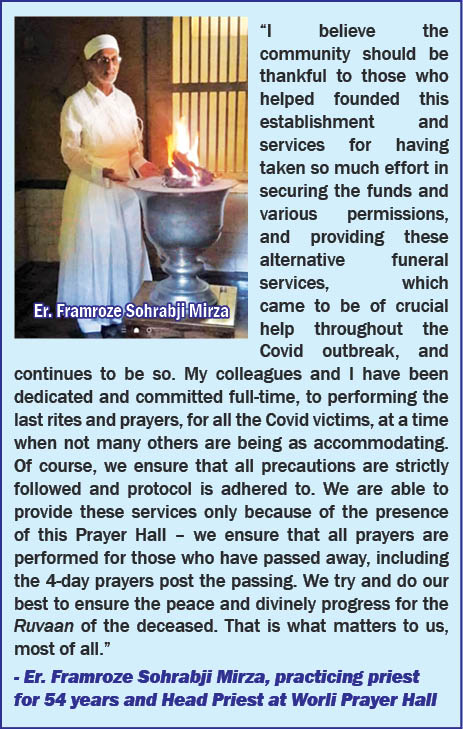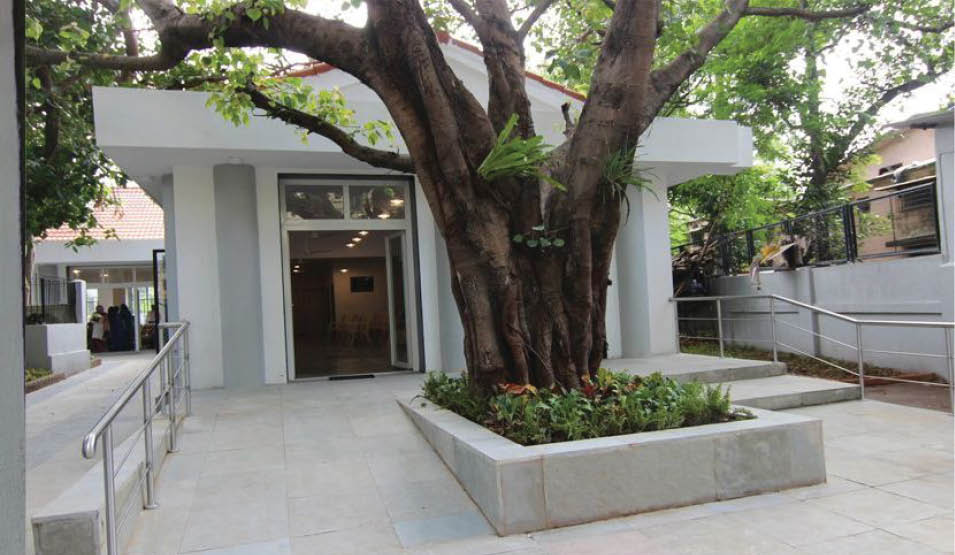 On 1st September, 2021, (Roj Sarosh, Mah Farvardin), the Prayer Hall located at Worli in Mumbai completed six years in the service of providing facilities and prayers for the last rites of deceased community members. A Jashan commemorating the occasion was performed at 11:00 am, by Worli Prayer Hall coordinator – Er. Framroze Mirza along with Er. Adil Navdar.
On 1st September, 2021, (Roj Sarosh, Mah Farvardin), the Prayer Hall located at Worli in Mumbai completed six years in the service of providing facilities and prayers for the last rites of deceased community members. A Jashan commemorating the occasion was performed at 11:00 am, by Worli Prayer Hall coordinator – Er. Framroze Mirza along with Er. Adil Navdar.
Parsi Times caught up with Dinshaw Tamboly who has been instrumental in the establishment of the Worli Prayer Hall, which has been a much-needed option for those who wanted to opt for an alternative means of performing the last rites of their dearly departed. The Worli Prayer Hall has proven to be especially beneficial to the community, in keeping with the ongoing Coronavirus pandemic, where those succumbing to the virus were not allowed the traditional last rites, in keeping with the safety protocol mandated by the State Government. From its inception to date, the Worli Prayer Hall has serviced over 600 funerals.
PT: Could you share with us the genesis of the Prayer Hall and the ideology behind its establishment for Parsis who wished for an alternative choice of funeral rites for their dearly departed?
 Dinshaw Tamboly: From the early 1980’s, we were faced with the reality of vultures fast vanishing from the Indian skies, to never return. India lost over 97% of its original vulture population before the turn of the last century. This was something that had never been contemplated earlier by residents of this city; and several community members began questioning the functioning of the dokhmas and started opting for the cremation of family members.
Dinshaw Tamboly: From the early 1980’s, we were faced with the reality of vultures fast vanishing from the Indian skies, to never return. India lost over 97% of its original vulture population before the turn of the last century. This was something that had never been contemplated earlier by residents of this city; and several community members began questioning the functioning of the dokhmas and started opting for the cremation of family members.
The problem was the state of public crematoria and the absence of a place where prayers could be carried out in peaceful surroundings, over the first 4 days of a person’s passing. The need was felt for a Prayer Hall where Parsi/Irani Zoroastrians, who opted for cremation, could be assured of obsequies being carried out over the first 4 days, which the majority of Zoroastrians consider very important.
The late Mr. Jamsheed Kanga, the then Municipal Commissioner of Mumbai, made several attempts to locate such a place, as did several other groups of individuals including the Association for Revival of Zoroastrianism. Mr. Kanga persevered well after he retired as Commissioner, to continue the quest for a Prayer Hall. Thanks to the high regard his successors had for him, the MCGM agreed, around 2009, to allot a plot of land where a Prayer Hall could be constructed within the Worli Crematorium complex, at the community’s cost, but in which Zoroastrians would have priority of use at the times when our prayers are normally held.
The establishment of the Prayer Hall has been the result of cohesive teamwork of many, but the main credit goes to two mentors – Jamsheed Kanga and Homi Khusrokhan, who worked tirelessly to build and commission the facility.
I have always believed that there should be dignity in death. During my stint as a BPP trustee, I had advocated to my fellow Trustees that the bunglis at Doongerwadi be made available for recitation of the four days prayers for those who opted for alternate funeral modes. This was not found acceptable.
Having always held that the departed should be given a dignified farewell and being a believer in the efficacy of our prayers, especially the first four days obsequies which were denied to those opting for cremation, I felt a great injustice being done to families who had opted for alternate modes of disposal. I therefore, readily participated in establishing the Prayer Hall at Worli, from where, those opting for cremation would be accorded a dignified farewell, with the customary obsequies being performed by priests who also believe in this philosophy.
The Prayer Hall is being increasingly used now and has proven to be a blessing, particularly during the ongoing Covid-19 pandemic, where cremation is now mandated for those whose death certificates show that they passed away because of the virus.
PT: Tell us about the efforts needed to set it up, in terms of funding, permissions, et al..
Dinshaw Tamboly: The Municipal Corporation extended full cooperation in allocating a plot of land of our choice within the Worli Complex. Our architects were Messrs ‘Epicons Consultants’, and our building contractor Mr. Ashok Punjabi of A. P. Enterprises, who had been associated with the House of Godrej; all worked as a well-knit, dedicated and committed team and brought the project to fruition in very good time.
To fund the construction of the Prayer Hall, we initially circulated an appeal to various individuals, and some of us Trustees also dug into our own pockets. We also discussed the proposal with the Trustees of A H Wadia Trust and requested their support, in response to which they sanctioned a munificent donation of Rs. 15,000,000 (Rupees fifteen million). Without their generous donation it would not have been possible to complete the construction of the facility within 16 months.
PT: When did the Prayer Hall commence its services for the Community and how many has it serviced so far?
Dinshaw Tamboly: The Prayer Hall was commissioned in September 2015 and till the end of August 2021, it has enabled a dignified farewell to over 604 Zoroastrians who opted for an alternate method of disposal.
The following is the year-wise count of funeral services provided:
2015: 33 (September to December)
2016: 97
2017: 77
2018: 73
2019: 90
2020: 116
2021: 119 – (January to August)
TOTAL – 605 funeral services offered from September, 2015 to August, 2021
PT: What are the prayer services offered to community members and what are the charges?
Dinshaw Tamboly: The Prayer Hall Services and Maintenance Trust does not charge for use of the Prayer Hall. The facilities are provided gratis to families wishing to utilise the Hall for performing the 4-day obsequies. As the Hall is tucked-away in one corner of the Worli complex which is a secluded area, a sense of privacy is maintained where the prayers can be recited in tranquil surroundings.
Families using the facility can opt for Mobeds of their own choice to perform the ceremonies and those who are unable to do so, are free to utilise the services of Er. Framroze Mirza, the Coordinator of the Prayer Hall and his team of Mobeds. It has been clarified time and again that the charges for services rendered by the Mobeds, should be a matter between the Mobeds and the families who opt for their services in which the Prayer Hall Services and Maintenance Trust has no role to play.
PT: What rules are to be observed (especially during Covid times) when entering the Hall?
Dinshaw Tamboly: Rules framed by the Government of Maharashtra and Municipal Corporation of Greater Mumbai have to be strictly observed. The maximum number of mourners permitted have to be adhered to. As of now, it is 20 persons.
For those who have passed away because of Covid, it is not permitted to bring the body into the Hall and the geh sarna prayers are recited alongside the hearse / ambulance, in which the body has been transported to the Hall. Subsequent obsequies can however be performed inside the Prayer Hall. All ceremonies for non-Covid deaths are performed as was done earlier, in the Prayer Hall.

- જેજે હોસ્પિટલના પારસી વોર્ડમાં નવરોઝની ઉજવણી - 5 April2025
- ઝોરોસ્ટ્રિયન વિમેન્સ એસોસિએશન ઓફ સુરત દ્વારા પાણી બચાવો પર્ફોર્મન્સ - 5 April2025
- આવાં યઝદના પરબની ઉજવણી - 5 April2025
